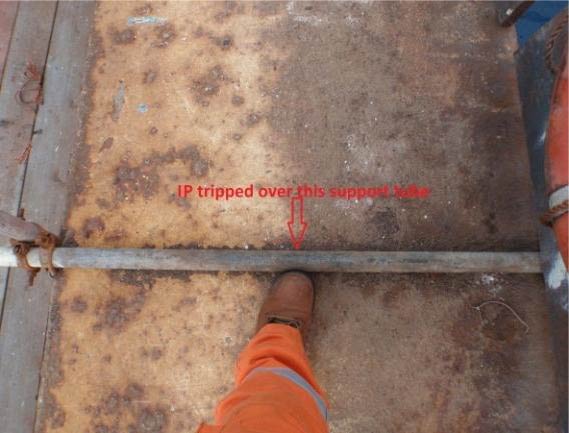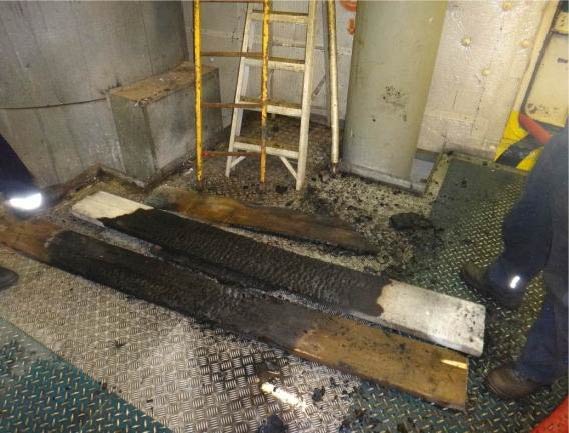Incidents involving use of scaffolding
A member has reported a number of incidents involving the use of scaffolding. Many activities on members’ vessels have to be done at locations which are hard to access or at a height. In order to be able to work at these locations scaffolding is erected. To ensure a safe and stable platform to work from, scaffolding is built according to industry standards and practices; a competent person should inspect the scaffolding before use, and tags are used to indicate if a scaffolding is safe to access or not. Despite these and other precautions, crew should still remain fully aware of their own safety and the safety of others when using scaffolding.
Four recent scaffolding related incidents, each with a brief summary as to the immediate cause:
Incident #1 -after a test blow of a hydraulic hammer, it was discovered that a scaffold pipe was damaged between the anvil and the casing.
Immediate cause: Although the site was inspected, the hazards were not recognised.
Incident #2 -a crewman was injured after tripping over a scaffold tube (supporting the handrail) whilst carrying an angle bar of approximately 15 kg.
Immediate causes: Poor co-ordination of the work activities, and there was no signage in place to warn of the obstacles.
Incident #3 -during renewal and repair activities, a plate supporting scaffolding was removed and replaced with a metal plate without having the scaffolding inspected by a competent person.
Immediate causes: Lack of sharing information between supervisors; owing to time pressure a ‘solution’ was found instead of stopping the job.
Incident #4 -scaffolding boards, which were out of sight, on top of the exhaust line, were left over from repair works and started to smoulder due to the heat of the exhaust line.
Immediate cause: Improper housekeeping after work was finished.



Our member drew the following lessons:
- Perform a full workplace risk assessment before starting the work;
- Keep walkways clear of obstacles, or otherwise mark obstacles;
- Never modify scaffolding;
- Remove all scaffolding material after the job, and contact scaffolding supervisor when scaffolding material is left behind.
Safety Event
Published: 23 September 2013
Download: IMCA SF 15/13
IMCA Safety Flashes
Submit a Report
IMCA Safety Flashes summarise key safety matters and incidents, allowing lessons to be more easily learnt for the benefit of all. The effectiveness of the IMCA Safety Flash system depends on Members sharing information and so avoiding repeat incidents. Please consider adding [email protected] to your internal distribution list for safety alerts or manually submitting information on incidents you consider may be relevant. All information is anonymised or sanitised, as appropriate.
IMCA’s store terms and conditions (https://www.imca-int.com/legal-notices/terms/) apply to all downloads from IMCA’s website, including this document.
IMCA makes every effort to ensure the accuracy and reliability of the data contained in the documents it publishes, but IMCA shall not be liable for any guidance and/or recommendation and/or statement herein contained. The information contained in this document does not fulfil or replace any individual’s or Member's legal, regulatory or other duties or obligations in respect of their operations. Individuals and Members remain solely responsible for the safe, lawful and proper conduct of their operations.
